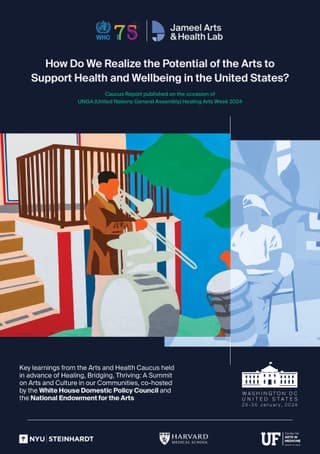Report

Pre-Summit Caucus
How Do We Realize the Potential of the Arts to Support Health and Wellbeing in the United States?
Background

White House Briefing Room
Executive Order on Promoting the Arts, the Humanities, and Museum and Library Services
Introduction
On January 29th, a Pre-Summit Caucus convened national leaders in the field of arts and health at the National Endowment for the Arts Headquarters in Washington, D.C. to envision tangible steps to value the arts as a part of how we understand health in the United States.
This Caucus was held in advance of Healing, Bridging, Thriving: A Summit on Arts and Culture in our Communities, co-hosted by the White House Domestic Policy Council and the National Endowment for the Arts.
The session was designed and led by Drs. Nisha Sajnani, Associate Professor of Drama Therapy at NYU Steinhardt, Chair of the NYU Creative Arts Therapies Consortium, and Founding Co-Director of the Jameel Arts & Health Lab; Jill Sonke, Director of Research Initiatives at the Center for Arts in Medicine at the University of Florida and Director of National Research and Impact, One Nation/One Project; and Lisa Wong, Assistant Professor of Pediatrics and Associate Co-Director of the Arts and Humanities Initiative at Harvard Medical School, with technical support from Sunil Iyengar, Research Director for the National Endowment for the Arts.
Participants were from federal agencies, national membership-based professional organizations, academic research institutions, and the private sector.
Key Points
The report summarizes salient themes and insights that arose during the Pre-Summit Caucus. Under the categories Policy, Communications, and Research, the following key themes were identified:
- Integrate the Arts within Current Policy: Participants discussed how to adapt arts and health programming to work within existing policy structures and frameworks.
- Policy Change: Participants shared the need to integrate the evidence for the health value of arts engagement at the outset of policy development at the city, state, and federal level.
- Increase Public Understanding of the Arts as a Health Resource: Participants identified the need for a national shift in public perception of the arts as a luxury to a recognition of the holistic health benefits of arts and cultural activities.
- Leverage New and Existing Evidence to Further the Field: Participants emphasized the need for strategies that increase the capacity for researchers, practitioners, and community partners to collect data about the processes and outcomes of arts and health interventions.
The views are solely the authors’ and do not represent the views of the National Endowment for the Arts.
Image: NYC Health + Hospitals/Metropolitan, Artwork Priscila De Carvalho. Photo by N. Knight, courtesy of NYC Health + Hospitals Arts in Medicine department.
Pathways Forward
- Adopt an "arts in all policies" approach
- Build infrastructure for research
- Expand licensure for Creative Arts Therapists and training for artists
- Integrate the arts in public health strategies to address social isolation and other health priorities
- Increase pathways for inter-sectoral collaboration at the federal level
- Increase pathways for inter-sectoral collaboration at the state and municipal level
- Launch a national communications campaign
- Establish ongoing opportunities to convene
Insights
Insights Slideshow
The Lab's Arts & Health activities in the United States
The Lab's Arts & Health activities in the United States Carousel
The Lab's Arts & Health activities in the United States Carousel Content-

Event
Healing Arts Atlanta
Healing Arts Atlanta launched with a focus on Championing the Role of the Arts in addressing Racism as a Public Health Crisis. The event precedes a major convening of researchers, artists, community leaders and policy makers to discuss how the arts can heal the wounds of racial trauma.

























